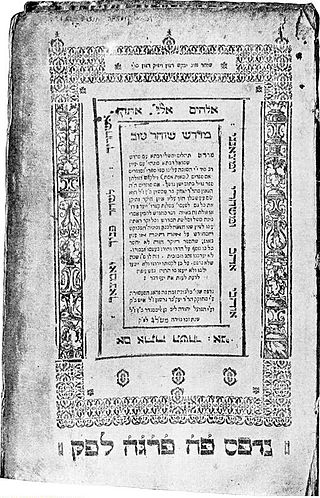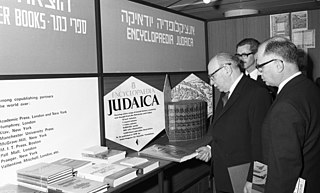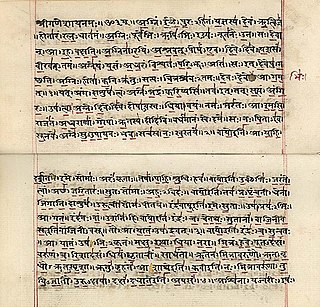
The Bible is a collection of religious texts or scriptures that are held to be sacred in Christianity, Judaism, Samaritanism, and many other religions. The Bible is an anthology – a compilation of texts of a variety of forms – originally written in Hebrew, Aramaic, and Koine Greek. These texts include instructions, stories, poetry, and prophecies, among other genres. The collection of materials that are accepted as part of the Bible by a particular religious tradition or community is called a biblical canon. Believers in the Bible generally consider it to be a product of divine inspiration, but the way they understand what that means and interpret the text can vary.

The deuterocanonical books are books and passages considered by the Catholic Church, the Eastern Orthodox Church, the Oriental Orthodox Churches, and the Assyrian Church of the East to be canonical books of the Old Testament, but which Protestant denominations regard as apocrypha. They date from 300 BC to 100 AD, mostly from 200 BC to 70 AD, before the definite separation of the Christian church from Judaism. While the New Testament never directly quotes from or names these books, the apostles most frequently used and quoted the Septuagint, which includes them. Some say there is a correspondence of thought, and others see texts from these books being paraphrased, referred, or alluded to many times in the New Testament, depending in large measure on what is counted as a reference.

The Epistle to the Hebrews is one of the books of the New Testament.

Midrash is expansive Jewish Biblical exegesis using a rabbinic mode of interpretation prominent in the Talmud. The word itself means "textual interpretation", "study", or "exegesis", derived from the root verb darash (דָּרַשׁ), which means "resort to, seek, seek with care, enquire, require", forms of which appear frequently in the Hebrew Bible.

The Septuagint, sometimes referred to as the Greek Old Testament or The Translation of the Seventy, and often abbreviated as LXX, is the earliest extant Greek translation of the Hebrew Bible from the original Hebrew. The full Greek title derives from the story recorded in the Letter of Aristeas to Philocrates that "the laws of the Jews" were translated into the Greek language at the request of Ptolemy II Philadelphus by seventy-two Jewish translators—six from each of the Twelve Tribes of Israel.

The Hebrew Bible or Tanakh, also known in Hebrew as Miqra, is the canonical collection of Hebrew scriptures, including the Torah, the Nevi'im, and the Ketuvim. Different branches of Judaism and Samaritanism have maintained different versions of the canon, including the 3rd-century Septuagint text used in Second Temple Judaism, the Syriac Peshitta, the Samaritan Pentateuch, the Dead Sea Scrolls, and most recently the 10th-century medieval Masoretic Text compiled by the Masoretes, currently used in Rabbinic Judaism. The terms "Hebrew Bible" or "Hebrew Canon" are frequently confused with the Masoretic Text, however, this is a medieval version and one of several texts considered authoritative by different types of Judaism throughout history. The current edition of the Masoretic Text is mostly in Biblical Hebrew, with a few passages in Biblical Aramaic.

The New World Translation of the Holy Scriptures (NWT) is a translation of the Bible published by the Watch Tower Bible and Tract Society; it is used and distributed by Jehovah's Witnesses. The New Testament portion was released first, in 1950, as The New World Translation of the Christian Greek Scriptures, with the complete New World Translation of the Bible released in 1961.

The Bible has been translated into many languages from the biblical languages of Hebrew, Aramaic, and Greek. As of September 2022 all of the Bible has been translated into 724 languages, the New Testament has been translated into an additional 1,617 languages, and smaller portions of the Bible have been translated into 1,248 other languages according to Wycliffe Global Alliance. Thus, at least some portions of the Bible have been translated into 3,589 languages.

The Epistle of Barnabas is a Greek epistle written between AD 70 and 132. The complete text is preserved in the 4th-century Codex Sinaiticus, where it appears immediately after the New Testament and before the Shepherd of Hermas. For several centuries it was one of the "antilegomena" ("disputed") writings that some Christians looked on as sacred scripture, while others excluded them. Eusebius of Caesarea classified it as such. It is mentioned in a perhaps third-century list in the sixth-century Codex Claromontanus and in the later Stichometry of Nicephorus appended to the ninth-century Chronography of Nikephoros I of Constantinople. Some early Fathers of the Church ascribed it to the Barnabas who is mentioned in the Acts of the Apostles, but it is now generally attributed to an otherwise unknown early Christian teacher, although some scholars do defend the traditional attribution. It is distinct from the Gospel of Barnabas.

The Jerusalem Bible is an English translation of the Bible published in 1966 by Darton, Longman & Todd. As a Catholic Bible, it includes 73 books: the 39 books shared with the Hebrew Bible, along with the seven deuterocanonical books as the Old Testament, and the 27 books shared by all Christians as the New Testament. It also contains copious footnotes and introductions.

The Encyclopaedia Judaica is a 22-volume English-language encyclopedia of the Jewish people, Judaism, and Israel. It covers diverse areas of the Jewish world and civilization, including Jewish history of all eras, culture, holidays, language, scripture, and religious teachings. First completed in 1971–1972, the encyclopedia had been published in two editions by 2010, accompanied by a few revisions.

The Jewish Publication Society of America Version (JPS) of the Tanakh was the first Bible translation published by the Jewish Publication Society of America and the first translation of the Tanakh into English by a committee of Jews. The full publication title is The Holy Scriptures According to the Masoretic Text: A New Translation with the Aid of Previous Versions and with Constant Consultation of Jewish Authorities.
James Barr was a Scottish Old Testament scholar, known for his critique of the notion that the vocabulary and structure of the Hebrew language may reflect a particular theological mindset. At the University of Oxford, he was the Oriel Professor of the Interpretation of Holy Scripture from 1976 to 1978, and the Regius Professor of Hebrew from 1978 to 1989.

The Tetragrammaton, or the Tetragram, is the four-letter Hebrew theonym יהוה, the name of God in the Hebrew Bible. The four letters, written and read from right to left, are yodh, he, waw, and he. The name may be derived from a verb that means "to be", "to exist", "to cause to become", or "to come to pass". While there is no consensus about the structure and etymology of the name, the form Yahweh is now accepted almost universally, though the vocalization Jehovah continues to have wide usage.
Eugene CharlesUlrich is an American Dead Sea scrolls scholar and the John A. O'Brien Professor emeritus of Hebrew Scripture and Theology in the Department of Theology at the University of Notre Dame. He is chief editor of the biblical texts of the Dead Sea scrolls and one of the three general editors of the Scrolls International Publication Project. Ulrich has worked under two editors in chief on the scrolls project, namely John Strugnell and Emanuel Tov.

Religious texts, including scripture, are texts which various religions consider to be of central importance to their religious tradition. They differ from literature by being a compilation or discussion of beliefs, mythologies, ritual practices, commandments or laws, ethical conduct, spiritual aspirations, and for creating or fostering a religious community.

The Israel Law Review is the oldest Israeli law journal published in English. In Great American Lawyers, an Encyclopaedia, it is referred to as being among "the most prestigious of scholarly journals". The journal focuses on Israeli law and on issues relevant to Israeli society.

Brian M. Hauglid is an emeritus professor of ancient scripture at Brigham Young University (BYU). From 2014 to 2017, he was the editor-in-chief of the Journal of Book of Mormon Studies, and he was the director of the Laura F. Willes Center for Book of Mormon Studies, a part of BYU's Neal A. Maxwell Institute for Religious Scholarship.

James Washington Watts is an American professor of religion at Syracuse University. His research focuses on the rhetoric of Leviticus. His publications also compare the Bible with other religious scriptures, especially in their ritual performances, social functions, and material symbolism.
Ehud Ben Zvi is a historian of ancient Israel, esp. in the Achaemenid period, a scholar of the Hebrew Bible, with a focus on Social Memory. He is Professor Emeritus in the Department of History, Classics and Religion at the University of Alberta.
















